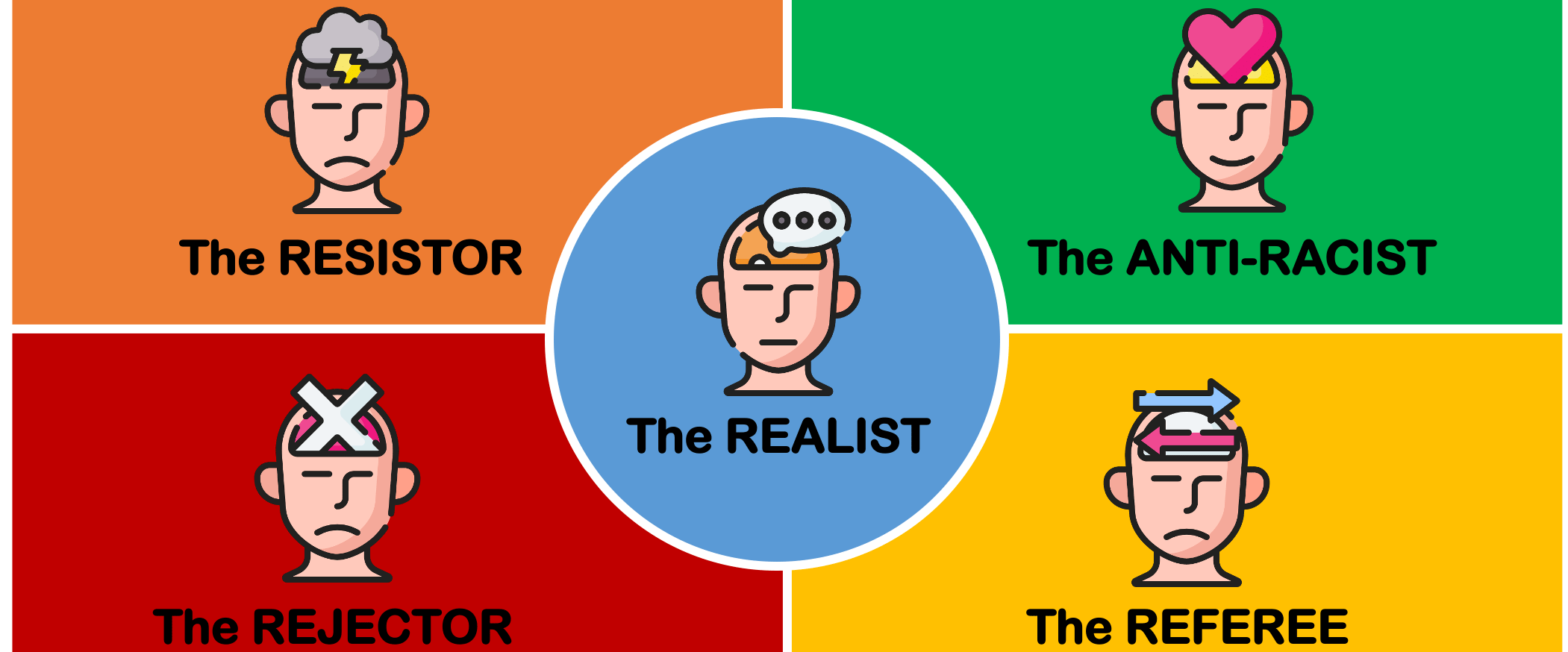The 5 Most Common Responses to Talking About Racism
After publicly speaking, podcasting, writing, discussing and educating about racism, I've observed that an individual's response to these conversations is an indicator of their true values.The 2 dimensions that have an overwhelming impact are Emotional Intelligence and Racial Awareness.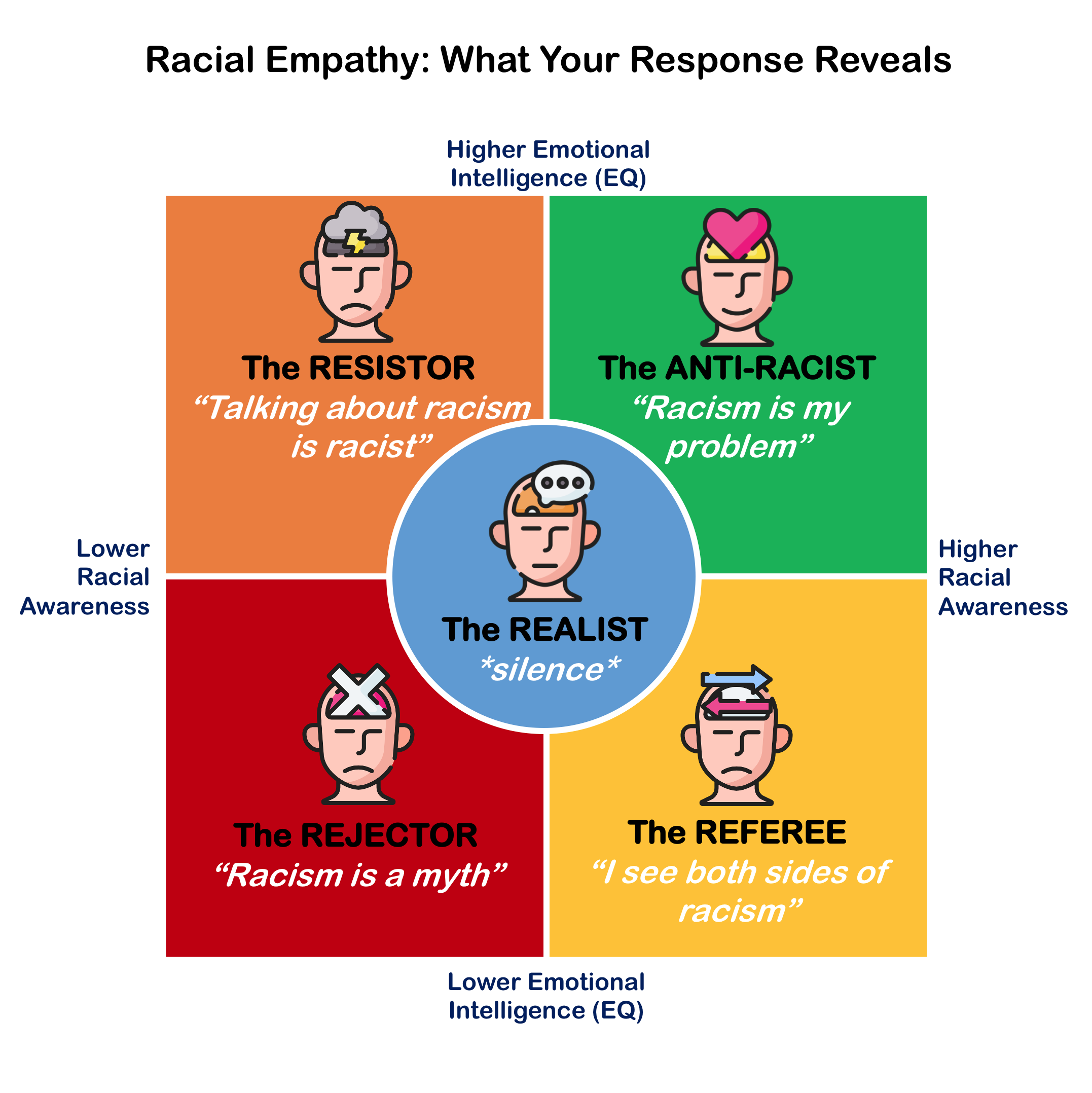 Emotional Intelligence (EQ) is the capacity to manage your own emotions and monitor those of others in a way that influences your thoughts, actions and even beliefs. Racial Awareness is exhibiting a consciousness of both individual and systemic racism (power + prejudice) within the context of white supremacy.While the comments, replies and messages I've received aren't necessarily confessions, there are patterns in theme, tone, background and emotional conviction that are worth noting. These are the 5 most common responses I've received when confronting racism.
Emotional Intelligence (EQ) is the capacity to manage your own emotions and monitor those of others in a way that influences your thoughts, actions and even beliefs. Racial Awareness is exhibiting a consciousness of both individual and systemic racism (power + prejudice) within the context of white supremacy.While the comments, replies and messages I've received aren't necessarily confessions, there are patterns in theme, tone, background and emotional conviction that are worth noting. These are the 5 most common responses I've received when confronting racism.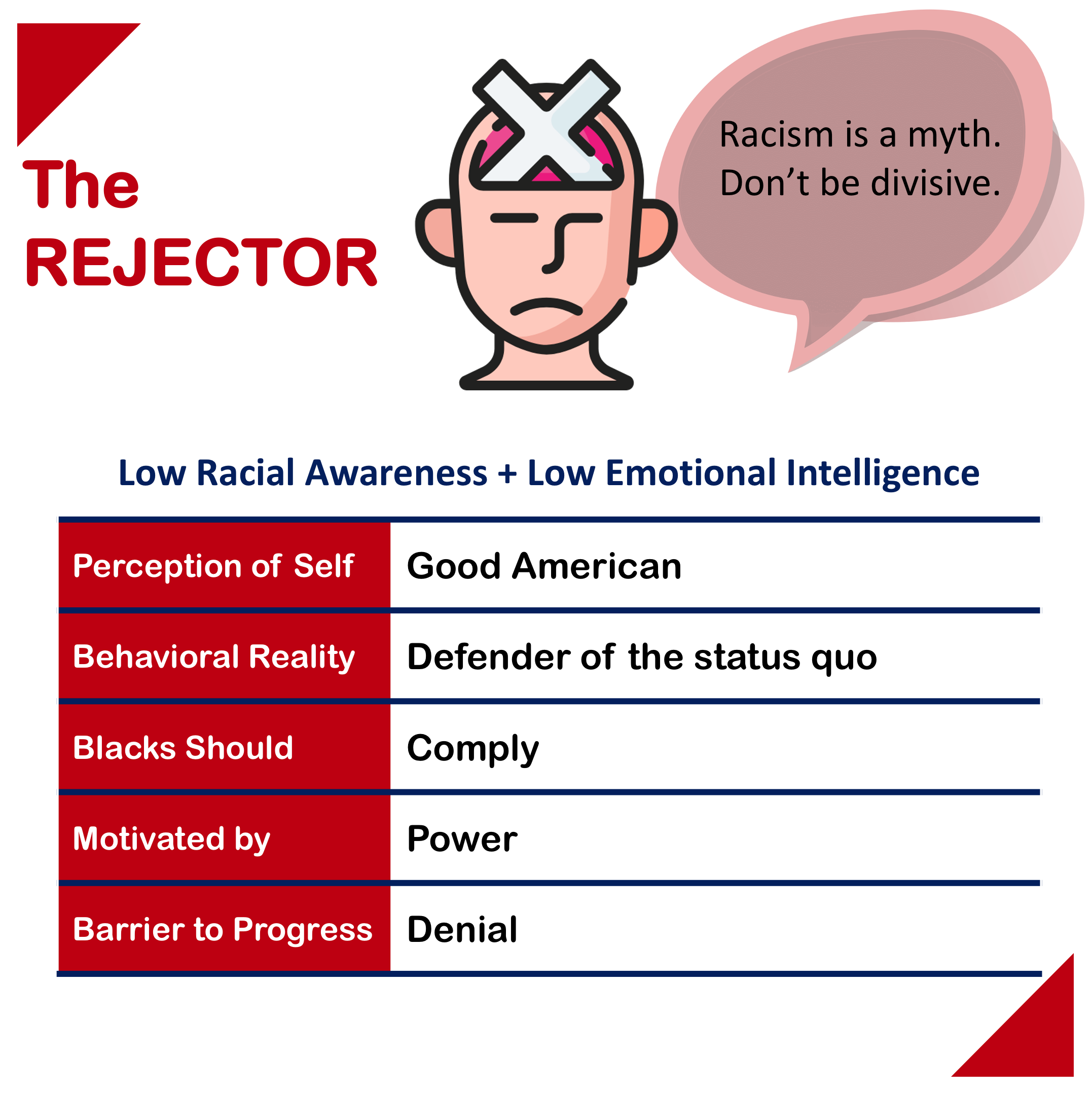 The Rejector believes America is functioning just fine so if we all work harder it will work for us too. He views my perceived success as proof racism is past-tense while ignoring any and all evidence to the contrary. To Rejectors, change equals defeat and compromise is for cowards. Truth is treason. I personally don't spend much time engaging here for the sake of my sanity.
The Rejector believes America is functioning just fine so if we all work harder it will work for us too. He views my perceived success as proof racism is past-tense while ignoring any and all evidence to the contrary. To Rejectors, change equals defeat and compromise is for cowards. Truth is treason. I personally don't spend much time engaging here for the sake of my sanity.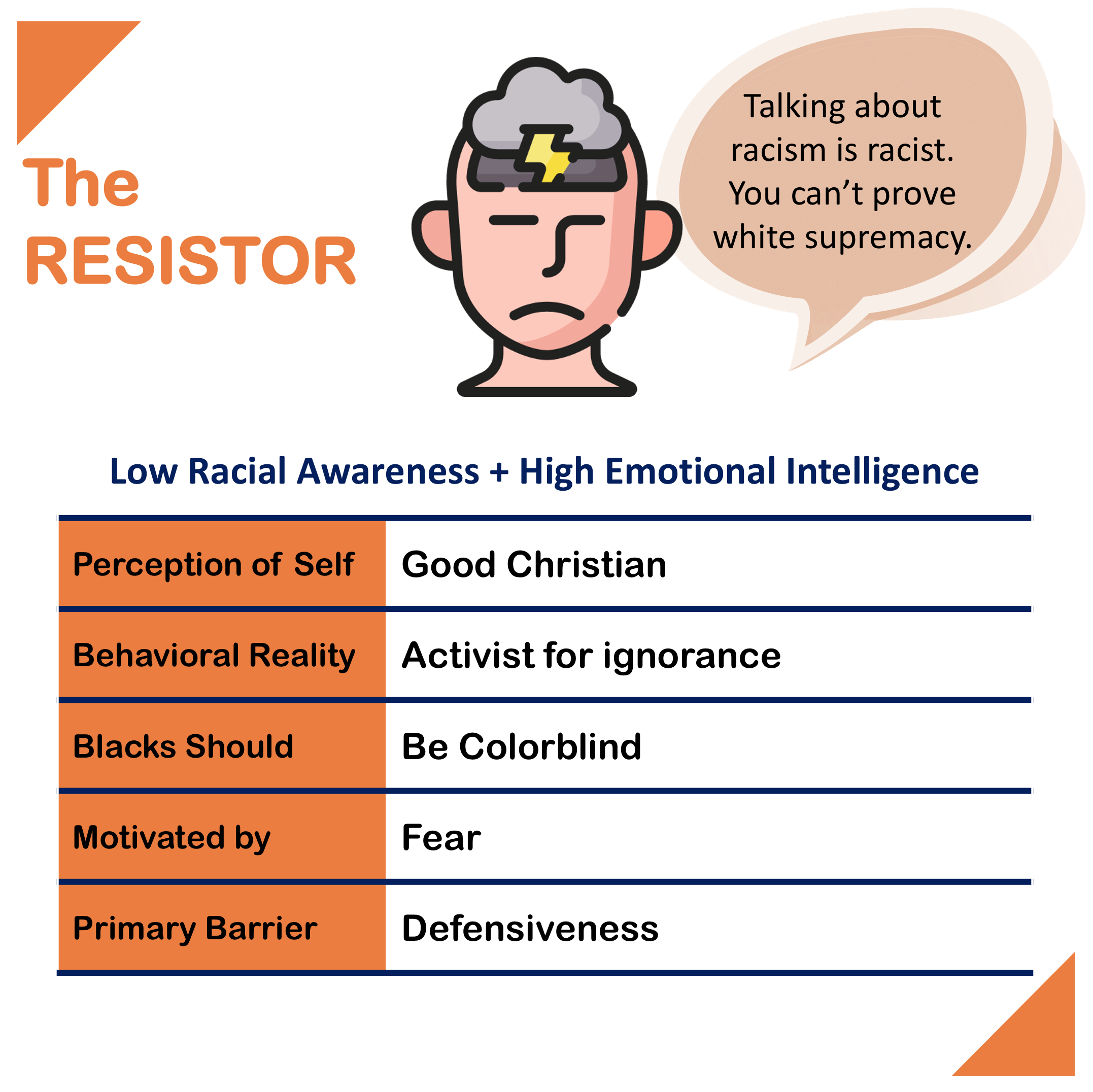 The Resistor calls for my immediate repentance for being a divisive racist. Like a 400-year-old fart, I smelt it so I certainly must have dealt it. Obviously, every Resistor isn't religious or even Christian, but in my experience they are much more inclined to promote their theology than to apply it. She has a big heart with selective EQ, caring about other causes while being offended at the notion Black people require "special attention." He thinks he has Black friends and feels personally attacked at any mention of "white supremacy." He's likely been hurt or felt threatened in the past.
The Resistor calls for my immediate repentance for being a divisive racist. Like a 400-year-old fart, I smelt it so I certainly must have dealt it. Obviously, every Resistor isn't religious or even Christian, but in my experience they are much more inclined to promote their theology than to apply it. She has a big heart with selective EQ, caring about other causes while being offended at the notion Black people require "special attention." He thinks he has Black friends and feels personally attacked at any mention of "white supremacy." He's likely been hurt or felt threatened in the past.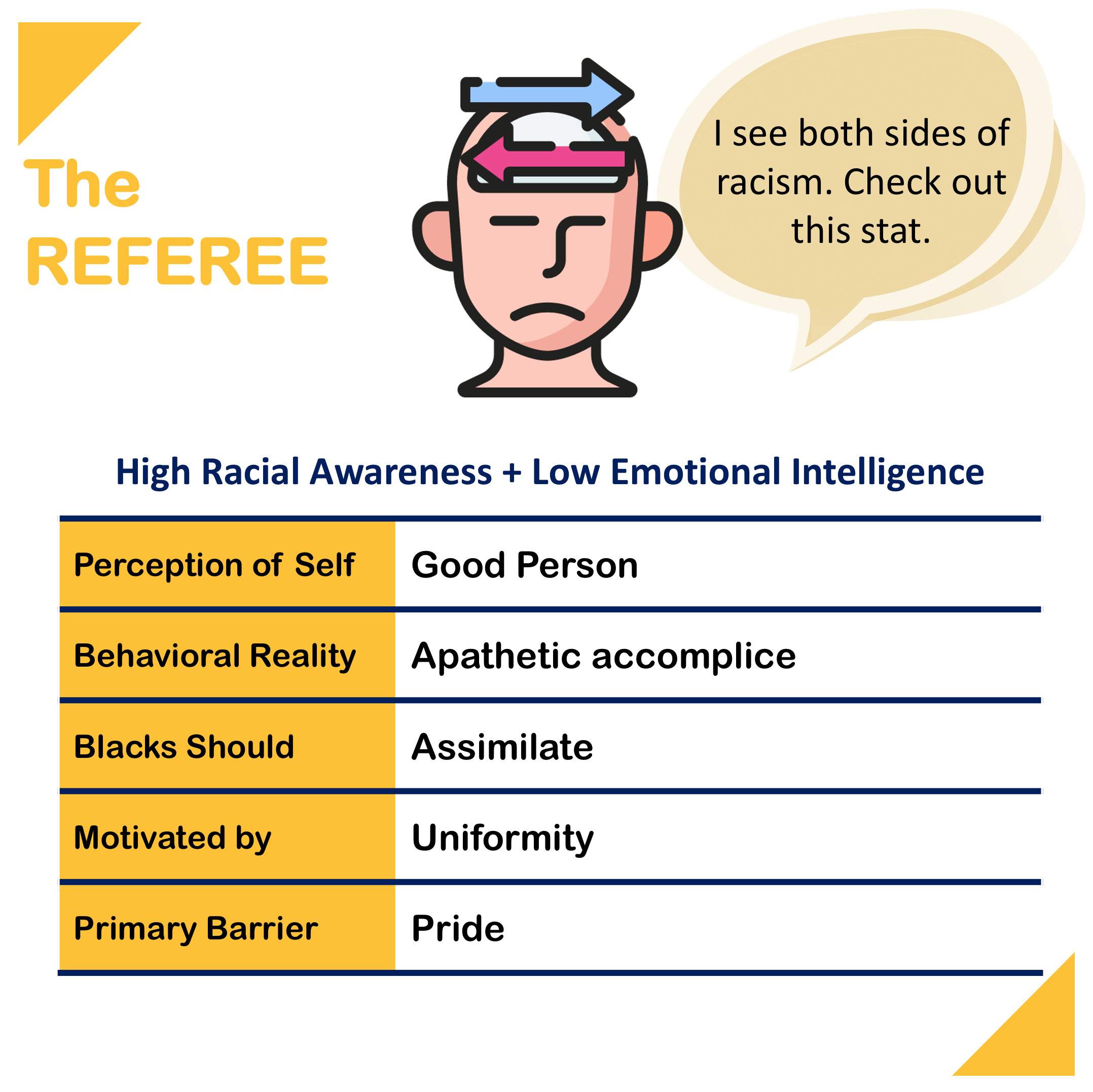 The Referee is a racial statistician, possessing an uncanny ability to use sloppy logic ("But what about black on black crime?") to assign equal weight to debates we shouldn't even be having. This great white gift for seeing "both sides” while completely ignoring the reality of hurt and history is a particularly helpful maneuver for observing Black pain – usually via an over-accommodating friend – with a built-in fire exit for returning to the safety of White culture. It grants him the mild appearance of social solidarity with people of color but preserves his privilege. Justice is his jump-rope so he hops in and out of debates, with no real desire for equality. The Referee fails to diagnose their own racist qualities in favor of comparison to others who are the "real racists."
The Referee is a racial statistician, possessing an uncanny ability to use sloppy logic ("But what about black on black crime?") to assign equal weight to debates we shouldn't even be having. This great white gift for seeing "both sides” while completely ignoring the reality of hurt and history is a particularly helpful maneuver for observing Black pain – usually via an over-accommodating friend – with a built-in fire exit for returning to the safety of White culture. It grants him the mild appearance of social solidarity with people of color but preserves his privilege. Justice is his jump-rope so he hops in and out of debates, with no real desire for equality. The Referee fails to diagnose their own racist qualities in favor of comparison to others who are the "real racists."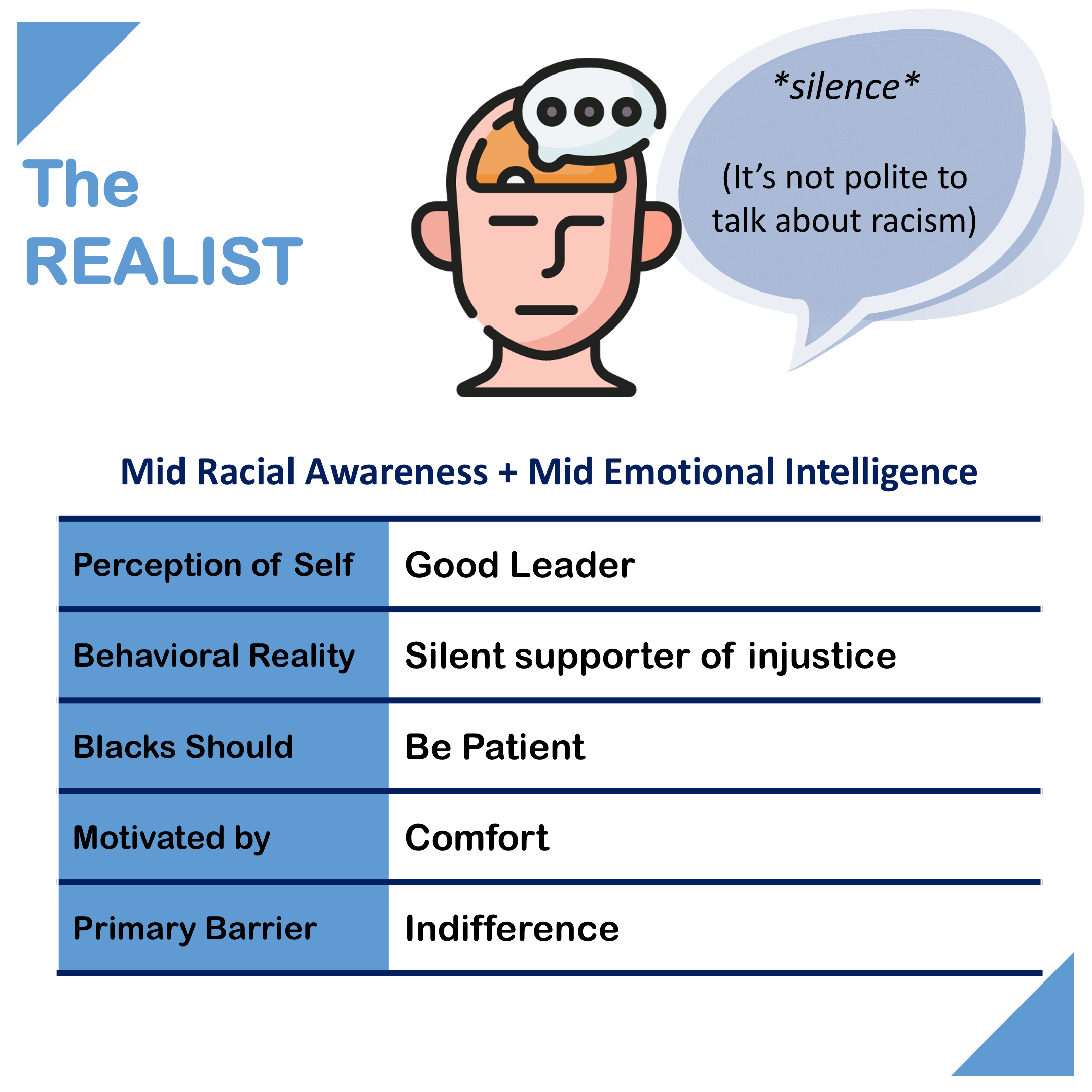 The Realist sits conveniently in the middle seat, silently positioned between supporting Black people and being a reasonable White person. She acknowledges racism as wrong but struggles to see it as deliberate or systemic. If racism is either historical or accidental there can’t be any accountability. If it's past tense, people who don’t currently own slaves shouldn’t be liable for the effects of slavery. The Realist didn’t “do” racism so he's clearly not racist. Silence is comfort. I think Realists are the key and I spent lots of time talking to them. (Read: Unrealistic Leadership: 10 Ways to Confront Racism in Your Organization)
The Realist sits conveniently in the middle seat, silently positioned between supporting Black people and being a reasonable White person. She acknowledges racism as wrong but struggles to see it as deliberate or systemic. If racism is either historical or accidental there can’t be any accountability. If it's past tense, people who don’t currently own slaves shouldn’t be liable for the effects of slavery. The Realist didn’t “do” racism so he's clearly not racist. Silence is comfort. I think Realists are the key and I spent lots of time talking to them. (Read: Unrealistic Leadership: 10 Ways to Confront Racism in Your Organization)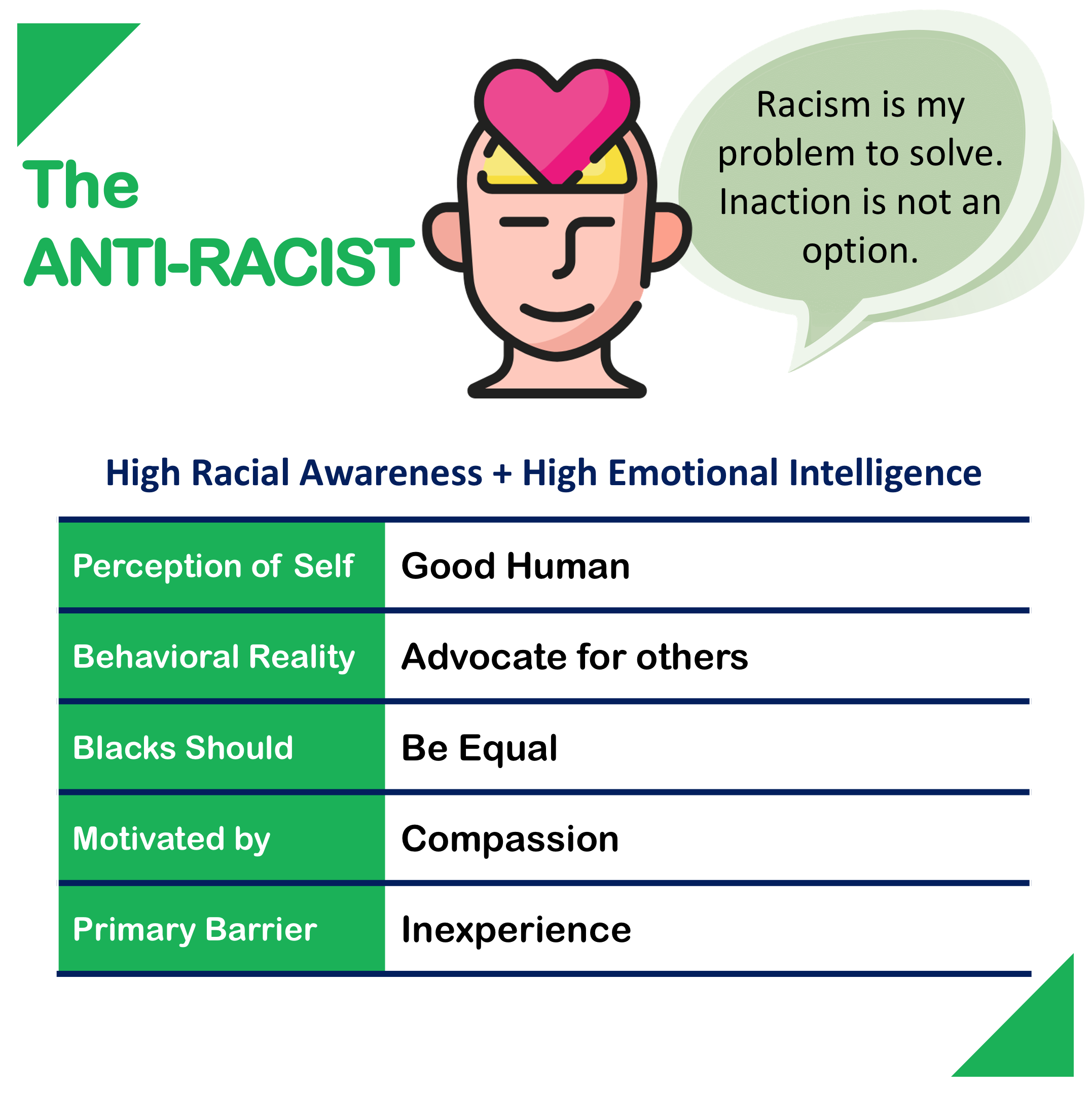 The Anti-Racist is actively engaging in social justice and continually learning. He has done something in the past 30 days that benefits someone who doesn't look, vote, pray, live or think like he does. He acknowledges his advantage and humbly uses it for others. Whether or not she has Black family or close friends, she views them as unique individuals deserving of true equality, not simply diversity programs. She's OK being clumsy and asking for help. He knows the word "compassion" means "to suffer together" and as long as America doesn't work for all of us, it doesn't work for him either.In closing, the intent of this post is neither to shame or affirm anyone's response. Rather, this is an attempt to organize these rough observations as I continue engaging in conversations where I can add value, and exiting when I can't. Simply stated, this is a point of reference, not a research paper.This admittedly over-simplified view of such a critical and complex subject is in service to arming Allies with a potential tool for focusing their efforts, instigating the Realists among us to "get in the fight," and identifying where effort is better spent elsewhere.To the vocal Referees and Resistors, you are free to disagree with my voice. You are not free, however, to decide if I have one. If this offends, I would encourage you to ask yourself why.I acknowledge my limitations. I don't speak for Black America and I'm not called to change everything or everyone I disagree with. But I also know that awareness, information and dialogue are core ingredients to convert apathy into empathy.Recently, someone asked me, "What's your goal?". Simple, it's compassion.
The Anti-Racist is actively engaging in social justice and continually learning. He has done something in the past 30 days that benefits someone who doesn't look, vote, pray, live or think like he does. He acknowledges his advantage and humbly uses it for others. Whether or not she has Black family or close friends, she views them as unique individuals deserving of true equality, not simply diversity programs. She's OK being clumsy and asking for help. He knows the word "compassion" means "to suffer together" and as long as America doesn't work for all of us, it doesn't work for him either.In closing, the intent of this post is neither to shame or affirm anyone's response. Rather, this is an attempt to organize these rough observations as I continue engaging in conversations where I can add value, and exiting when I can't. Simply stated, this is a point of reference, not a research paper.This admittedly over-simplified view of such a critical and complex subject is in service to arming Allies with a potential tool for focusing their efforts, instigating the Realists among us to "get in the fight," and identifying where effort is better spent elsewhere.To the vocal Referees and Resistors, you are free to disagree with my voice. You are not free, however, to decide if I have one. If this offends, I would encourage you to ask yourself why.I acknowledge my limitations. I don't speak for Black America and I'm not called to change everything or everyone I disagree with. But I also know that awareness, information and dialogue are core ingredients to convert apathy into empathy.Recently, someone asked me, "What's your goal?". Simple, it's compassion.